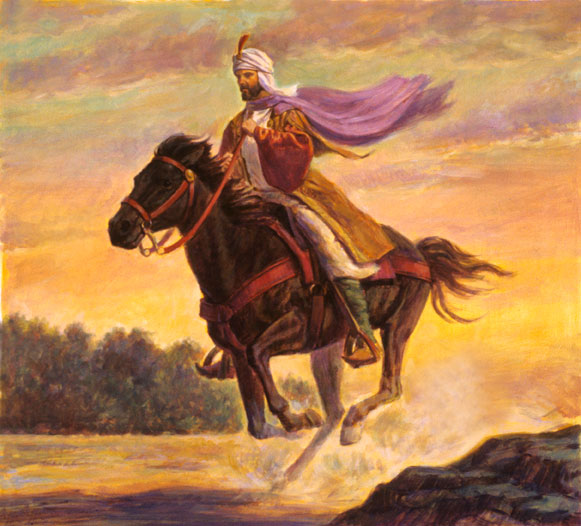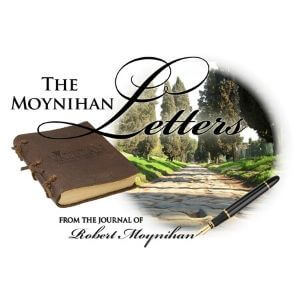
The Persian wise man, Artaban, hero of the book The Other Wise Man, written in 1895 by Henry van Dyke. The book tells how Artaban, who had planned to set out with the other three wise men (magi) — Caspar, Melchior and Balthasar (link and link) — to find the Christ Child, was delayed along the way. He comes to Jerusalem after Joseph, Mary and Jesus had fled to Egypt, and sets out after the slaughter of the innocents to find them in Egypt. But many years pass, and he does not find the child… then, an old man, he makes one final trip, to Jerusalem….
Letter #7, 2022, Thursday, January 6: Artaban, Part #10
Feast of the Epiphany
We received this letter from a reader in response to my last letter which I thought worth sharing with you on this Feast of the Epiphany (I send the letter exactly we received it, without correcting minor grammatical errors):
“After listening to this 9th chapter, I very moved also joyful and full of expectations waiting anxiously for tomorrow’s last, sigh chapter of Artaban‘s experience in outstanding story The Other Wise Man.
I have so enjoyed this story and all content on The Moynihan Letters.
Thank you most kindly Dr. Moynihan. —Biserka Brito“
Thanks for this kind note, Biserka.
What Is the Epiphany?
The feast of the Epiphany of Our Lord, celebrated on January 6th (today), as Catholic writer Gillian Weyant notes, tends to connote one thing primarily among many Catholics.
Upon hearing the words “Feast of the Epiphany,” many Catholics think only of the adoration of the magi after the birth of Jesus.
While this event is indeed part of the celebration of the Epiphany, it is but one component of what is ultimately a more extensive and important feast.
According to the Catechism of the Catholic Church, “The Epiphany is the manifestation of Jesus as Messiah of Israel, Son of God and Savior of the world. The great feast of Epiphany celebrates the adoration of Jesus by the wise men (magi) from the East, together with his baptism in the Jordan and the wedding feast at Cana in Galilee.” (link)
In this way, the scope of the Epiphany is greater than simply the adoration of the magi.
But the adoration of the magi is a central part of the feast, and so it seemed appropriate to offer to you in these days between Christmas and Epiphany the story of one of the magi, the “fourth wise man”— a wise man named Artaban, not known to history, but presented to us in a moving tale by Henry van Dyke in 1895 — so that we might reflect upon what it means to seek Christ, in order to give honor Him as the promised King, and what it may mean to set out on that journey in search of Him, even today, so many centuries later…
“After Jesus was born in Bethlehem in Judea, during the time of King Herod, Magi from the east came to Jerusalem…” —Gospel of Matthew (Matthew 2:1)
“Who seeks for heaven alone to save his soul,
May keep the path, but will not reach the goal;
While he who walks in love may wander far,
Yet God will bring him where the blessed are.”
—Henry van Dyke, the opening verses in his book “The Other Wise Man” (published in 1895, 127 years ago now)
Why this story
As the new year begins, I am continuing to publish daily readings in 10 parts of a little-known fictional story about… a fourth “wise man”(!) from the East named Artaban — for reasons I gave in my Letter #197, sent out at the end of last year…
Artaban, like the other wise men, his friends, planned in about 2 B.C. to set out from Persia to seek and honor the Child Jesus.
But Artaban is delayed on his way, and does not arrive in Bethlehem in time to see the new-born Jesus.
Here below is the text of Part #10 of this story, so you may listen to the reading and read along with the text…
We will also publish all 10 parts in one complete video reading of “The Other Wise Man” tomorrow.
Also, if anyone thinks this is a good trial run for more readings of this type, please write back and tell us, to advise us whether these readings are something we might continue, to assist those who are older and have poor eyesight, or those who are very young and need help in reading to enjoy some of the great stories in our tradition…. Let us know your judgment…
“The Other Wise Man”
We have now posted the 10th in a 10-part series of a reading of the classic Christmas story “The Other Wise Man.” It is available here on YouTube (or by clicking the video below) or on Rumble.
The story was written by Henry Van Dyke in 1895 (link). We offer this to you as a kind of Christmas present during the 12 days of Christmas. We hope that it might be a type of pilot for the creation of a kind of “book club” in which we would prepare readings of great stories and documents to try to help families, especially during this time of lockdown, to have time for reading together with children and grandchildren, during the holidays, and throughout the year. If you have a comment or suggestion, please feel free to respond to this email, or send an email to [email protected]
Here is the text of Part #10 of the story of “The Other Wise Man,” by Henry van Dyke:
Part #10: The Other Wise Man
By Henry van Dyke
So the old man followed the multitude with slow and painful steps towards the Damascus gate of the city.
Just beyond the entrance of the guard-house a troop of Macedonian soldiers came down the street, dragging a young girl with torn dress and disheveled hair.
As the Magian paused to look at her with compassion, she broke suddenly from the hands of her tormentors, and threw herself at his feet, clasping him around the knees. She had seen his white cap and the winged circle on his breast.
“Have pity on me,” she cried, “and save me, for the sake of the God of Purity! I also am a daughter of the true religion which is taught by the Magi. My father was a merchant of Parthia, but he is dead, and I am seized for his debts to be sold as a slave. Save me from worse than death.”
Artaban trembled.
It was the old conflict in his soul, which had come to him in the palm-grove of Babylon and in the cottage at Bethlehem—the conflict between the expectation of faith and the impulse of love.
Twice the gift which he had consecrated to the worship of religion had been drawn from his hand to the service of humanity.
This was the third trial, the ultimate probation, the final and irrevocable choice.
Was it his great opportunity, or his last temptation?
He could not tell.
One thing only was clear in the darkness of his mind—it was inevitable.
And does not the inevitable come from God?
One thing only was sure to his divided heart—to rescue this helpless girl would be a true deed of love.
And is not love the light of the soul?
He took the pearl from his bosom. Never had it seemed so luminous, so radiant, so full of tender, living lustre. He laid it in the hand of the slave.
“This is thy ransom, daughter! It is the last of my treasures which I kept for the King.”
While he spoke, the darkness of the sky thickened, and shuddering tremors ran through the earth, heaving convulsively like the breast of one who struggles with mighty grief.
The walls of the houses rocked to and fro. Stones were loosened and crashed into the street. Dust clouds filled the air. The soldiers fled in terror, reeling like drunken men.
But Artaban and the girl whom he had ransomed crouched helpless beneath the wall of the Praetorium.
What had he to fear? What had he to live for? He had given away the last remnant of his tribute for the King. He had parted with the last hope of finding Him.
The quest was over, and it had failed.
But, even in that thought, accepted and embraced, there was peace.
It was not resignation.
It was not submission.
It was something more profound and searching.
He knew that all was well, because he had done the best that he could, from day to day.
He had been true to the light that had been given to him.
He had looked for more.
And if he had not found it, if a failure was all that came out of his life, doubtless that was the best that was possible.
He had not seen the revelation of “life everlasting, incorruptible and immortal.”
But he knew that even if he could live his earthly life over again, it could not be otherwise than it had been.
One more lingering pulsation of the earthquake quivered through the ground.
A heavy tile, shaken from the roof, fell and struck the old man on the temple.
He lay breathless and pale, with his gray head resting on the young girl’s shoulder, and the blood trickling from the wound.
As she bent over him, fearing that he was dead, there came a voice through the twilight, very small and still, like music sounding from a distance, in which the notes are clear but the words are lost.
The girl turned to see if some one had spoken from the window above them, but she saw no one.
Then the old man’s lips began to move, as if in answer, and she heard him say in the Parthian tongue:
“Not so, my Lord: For when saw I thee an hungered and fed thee? Or thirsty, and gave thee drink? When saw I thee a stranger, and took thee in? Or naked, and clothed thee? When saw I thee sick or in prison, and came unto thee? Three-and- thirty years have I looked for thee; but I have never seen thy face, nor ministered to thee, my King.”
He ceased, and the sweet voice came again. And again the maid heard it, very faintly and far away. But now it seemed as though she understood the words:
“Verily I say unto thee, Inasmuch as thou hast done it unto one of the least of these my brethren, thou hast done it unto me.”
A calm radiance of wonder and joy lighted the pale face of Artabanlike the first ray of dawn on a snowy mountain-peak.
One long, last breath of relief exhaled gently from his lips.
His journey was ended.
His treasures were accepted.
The Other Wise Man had found the King.
THE END
(Tomorrow we will publish the entire story in one file. Thank you for your time and patience in reading and listening to this story…)
Our Work: An Overview
We ask you to support Urbi et Orbi Communications with a small or large contribution, at this difficult time, in order…
(1) to keep Inside the Vatican Magazine (which we have published since its founding in 1993, more than 28 years ago) independent and comprehensive… Now available to you digitally as well as in print! Now offering Virtual Events, ITV Writer’s Chat and Reader’s Chat!
(2) to ensure that Inside the Vatican Pilgrimages can keep creating encounters.
(3) to help bring the Catholic Church and the Orthodox Churches closer together by “building bridges” through our non-profit Urbi et Orbi Communications.
(4) to sustain our occasional news and analysis emails, The Moynihan Letters, bringing valuable information and insight to thousands of readers around the world.
Please, do not overlook this opportunity to work with us. We very much appreciate your gift, whether small or large.
Thank you.
In Christ,

Dr. Robert Moynihan and the rest of the Urbi et Orbi Team










Facebook Comments